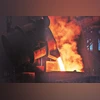The world's biggest steelmakers are falling behind in the shift towards low-carbon production, with some still entirely dependent on fossil fuels for their energy, a survey of 18 leading firms showed on Friday.
Steel is responsible for 7% of global carbon dioxide emissions, around the same as India, with coal-fired blast furnaces producing 2 metric tons of CO2 for each ton of output.
Alternative technologies are available, including electric arc furnaces (EAFs) that can be powered with renewables, and efforts are underway to produce iron using "green hydrogen" rather than coal.
But some of the industry's biggest names still relied on fossil fuels for 99% of their energy over 2022-2023, the Sydney-based climate group Action Speaks Louder (ASL) said.
Steel is considered a "hard to abate" sector, but the main obstacle is affordability, said Laura Kelly, ASL's strategy director and the survey's author.
"This messaging about 'hard to abate' is still implying it is not technologically possible," she said.
More From This Section
The best performer was Sweden's SSAB, which sourced 19% of its energy from renewables, while some of the biggest laggards were in South Korea.
The share of renewables in the energy use of Hyundai Steel, Dongkuk Steel and Posco stood at zero or close to zero, even though they produce large quantities of steel through EAFs. None of the firms responded to requests for comment.
Kelly said some firms have vested interests in maintaining the status quo because of investments in fossil fuel infrastructure, including import terminals and pipelines.
India's JSW Steel sourced 0.4% of its energy from renewables. It aims to run all its steel operations using clean energy and waste gas by 2030, said chief sustainability officer Prabodha Acharya.
Baosteel, China's biggest steelmaker, also sourced 0.4% of its energy from renewables in 2022. The company told Reuters it was drawing up new clean energy targets.
Steelmakers will come under growing pressure to shift to cleaner energy as carbon pricing initiatives come into force.
"If it is not hurting them financially now, it is hurting them strategically because they are lagging on that transition plan," Kelly said.
)